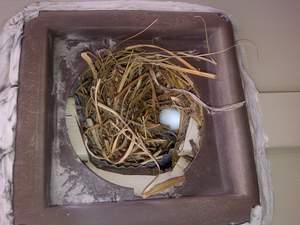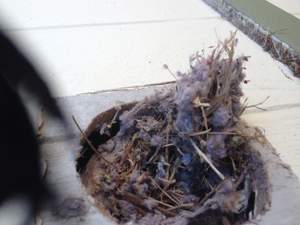FARMINGTON HILLS, MI--(Marketwired - Apr 21, 2014) - According to Dryer Vent Wizard (DVW) technicians, birds' nests are frequently a source of clogged dryer vents and customer calls for service during spring and early summer months.
The company, which specializes in dryer vent repair, replacement, cleaning and maintenance, typically receives calls for service from residential and commercial customers when dryers are overheating or not working efficiently.
"I'm a bird lover myself and have bird feeders in my back yard," said Jim Buie, a DVW franchisee in North Carolina who services Raleigh, Chapel Hill, Durham and neighboring communities. "Unfortunately, the birds are looking for a protective, natural habitat for their nests, and dryer vents present an inviting alternative. We often find that birds will build their nests up to six feet into the vent which has only a four inch diameter.
This is where it gets tricky. A nest will block the dryer vent causing it to fill up with lint, so the dryer runs less efficiently and can cause the dryer to fail. Since the nest has blocked the air flow, moisture condenses in the dryer vent instead of being vented to the outside causing standing water inside the vent that can result in leaks. This not only causes unsightly stains on walls and ceilings but can also result in unwanted mold and mildew in the home.
"I've gone on calls where screens had been installed over the vent opening after the birds had already nested, trapping the birds inside the vent. With no exit, the birds followed the only path available and wound up inside the dryer," added Buie. He says that screens should never be used to block the dryer vent opening, and he recommends that homeowners request the specially designed bird resistant cover that DVW technicians can install.
Daryl Gray, a new franchisee in Georgia, recently ran into a huge bird's nest on one of his first service calls. His area includes Conyers to Augusta, as far north as Winder and as far south as Milledgeville.
"I was contacted because there was a bad smell coming from the dryer," said Gray. "Someone from another company had come out and attached an old metal cover over the vent, but they didn't clean out the vent. I found the bird's nest seven to eight feet down the line itself, cleaned out the vent and checked to make sure everything was working properly."
DVW also carries a sanitizer that is recommended for newly cleaned vents to help protect against potential diseases that birds can carry.
When service calls are made to take care of birds' nests, DVW technicians often uncover other serious issues including bad connections behind the dryer and previous lint fires that have already occurred inside the dryer -- without the owner's knowledge.
"Many people are unaware how much lint can accumulate in the dryer and suddenly result in a flash fire," added Buie, who works to educate customers about proper maintenance and regular check ups.
Along with providing cleaning and maintenance services to help prevent dryer fires, DVW franchisees and technicians help raise public awareness about fire prevention and energy savings.
Headquartered in Farmington Hills, Michigan, Dryer Vent Wizard is a member of the National Fire Protection Association (NFPA). With more than 70 franchise owners, DVW serves more than 9,000 communities of all sizes throughout U.S. and Canada. For more information and to learn more about franchise opportunities, visit www.DryerVentWizard.com or call 866-498-SAFE (7233) in the U.S. and 866-395-SAFE (7233) in Canada.
Contact Information:
Media Contacts:
Terry Reuer
Dryer Vent Wizard
586-619-2160, ext. 550
Margaret Blohm, APR
Margaux & Associates, LLC
313-406-3467

